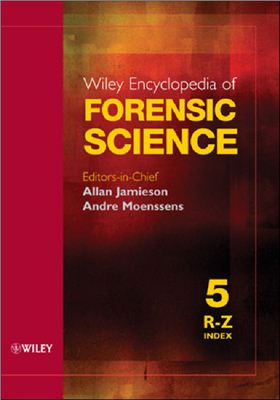Wiley, 2009. - 3104 pages.
This A to Z encyclopedia provides a comprehensive, definitive, and up-to-date reference of the main areas of specialist and expert knowledge and skills used by those involved in all aspects of the forensic process, including, but not limited to, forensic scientists, doctors, practicing and academic lawyers, paralegals, police, crime scene investigators, analytical chemists, behavioral scientists and toxicologists.
This five-volume set covers all topics which, either as part of an established forensic discipline or as a potentially useful emerging discipline, are of interest to those involved in the forensic process. This includes both the scientific methodology and the admissibility of evidence. The encyclopedia also provides case studies of landmark cases in the definition and practice of forensic science.
Wiley Encyclopedia of Forensic Science presents all material on a level and in a style that makes it accessible to a wide range of readers. In particular, lawyers needing to better understand the key aspects of the science, and scientists who require a deeper insight into legal issues will find the encyclopedia an important resource, as will physical, biological and behavioral scientists who require background information on the most important aspects of each other’s areas of expertise.
This A to Z encyclopedia provides a comprehensive, definitive, and up-to-date reference of the main areas of specialist and expert knowledge and skills used by those involved in all aspects of the forensic process, including, but not limited to, forensic scientists, doctors, practicing and academic lawyers, paralegals, police, crime scene investigators, analytical chemists, behavioral scientists and toxicologists.
This five-volume set covers all topics which, either as part of an established forensic discipline or as a potentially useful emerging discipline, are of interest to those involved in the forensic process. This includes both the scientific methodology and the admissibility of evidence. The encyclopedia also provides case studies of landmark cases in the definition and practice of forensic science.
Wiley Encyclopedia of Forensic Science presents all material on a level and in a style that makes it accessible to a wide range of readers. In particular, lawyers needing to better understand the key aspects of the science, and scientists who require a deeper insight into legal issues will find the encyclopedia an important resource, as will physical, biological and behavioral scientists who require background information on the most important aspects of each other’s areas of expertise.

